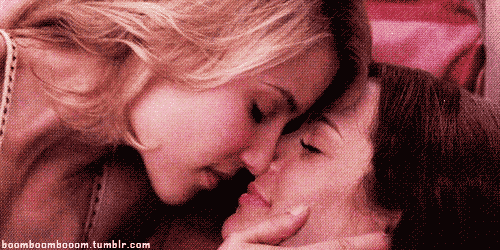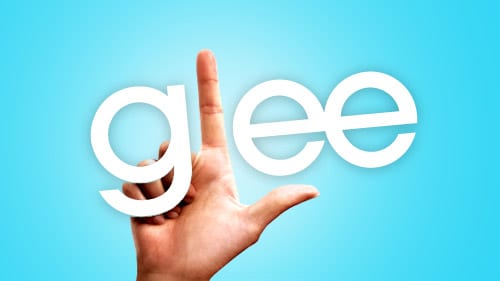Whoa, guys. It’s been a few weeks hasn’t it? Doesn’t feel like it sometimes, but it’s been a few weeks. I’m sure you feel it more than I do, and for that I’m sorry. But I have a good reason!
The reason is… my god, am I tired ofGlee. I know, shocking. But season 4 was a slog, and season 5 is even more so. I hit a brick wall called Apathy, and I smashed my face against it so hard I couldn’t continue. I started to lose sight of why I started this rewatch in the first place, and I just wanted to wash my hands of the whole thing.

But then I started washing my car over the weekend, and I started listening to some of the Greatest Hits, so to speak. “Come What May” between Kurt and Blaine, Santana slaying “Don’t Rain on My Parade” where Rachel had failed, a few of the “Don’t Stop Believing” tracks, and the season 3 nationals performance. I realized something. I was losing sight of what Glee was really about. I got so caught up in the play-by-play, I lost sight of the music.
Okay, no. Not the music. Okay, not JUST that. But the music is a symptom of what carried it forward.
Glee, as I have said in the earlier articles, is about a feeling. And before I start diving into the disaster that is season 5, I want to go back to that feeling. And not just a feeling, either. Glee was about a community. A community that was so huge, so constructed, that it set a precedent for every queer representation show going forward.
Yes, we’re finally here. We’re gonna talk about Faberry, though likely not in the detail you’d like me to go into. Because it’s not just about that, it’s about something more.
Way back in the wild west days of 2009, Tumblr and fandom Twitter were still kind of in their infancy. The idea that fandom could affect a tv show was not new, but the format which Glee set was definitely new territory. Brittana was the ship that fandom built. If not for the fandom support, we wouldn’t have had Naya Rivera going to bat for it. We likely wouldn’t have gotten the endgame we did without this fandom format either. You can trace a similar arc for Klaine, though arguably that was a foregone conclusion in the show. Either way, the fandom was the thing that drove these queer ships, and that was pretty damn novel at the time.
You see, once upon a time, The Discourse was called Fanwanking. And a large part of why it was called that is because it had a bit of this masturbatory feeling to it. That it was just for the sake of itself, never with the intention or aspiration that it would have any quantifiable effect on the show it was written about. Glee, in my opinion, was one of the big turning points for this.
If you remove it from its fan interaction, Glee was already pretty queer to begin with. But I don’t think it would have been the queer behemoth it became without the modern rise of fandom culture, sans censorship. It was the first show I can think of that truly was absorbed in the fandom culture in the modern way we think of it: that the creators were in any way, no matter how small, beholden to a fandom standard. That we wanted something to happen, and it did. Specifically because we demanded it.
That’s quite novel and groundbreaking, even by today’s standards.
Glee came into prominence almost at the same time as the modern iteration of Fandom Culture did. The gifs, the fanart, the fanfic, all of it. This is all a very modern concept. Not just fandom’s existence, god no. Star Trek fan zines started circulating in the 70’s and 80’s. I’m talking about the modern, online culture that has developed around the fans having direct access to the creators via social media, an easy way to post their fan content, and both of these things not being seen as a bad thing.
Glee was one of the pioneers of modern fandom because we were allowed to bitch and moan about a new development in a show. We were also able to do our own ‘fandom corrections’ of the show without being hit with Cease-and-Desist letters left and right.

The very idea that the Faberry ship could not only exist, but freely and openly on the internet with precious little interference by the parent company, is nothing short of astounding.
Ever read a fanfic and wondered why the author included a note about not owning the characters and not being a copyright infringement? It’s likely a relic of a time gone by in which you couldn’t write fanfic without locking it behind an age restriction or possibly a paywall. There was a time in which fan culture was considered a cancer upon a copyright holder’s rightful financial claim to a property. Really weird to think about that happening now, isn’t it?
Once upon a time, even simple gifs of a show were considered copyright infringement to the point that it was worth pursuing legal action. We have moved so far past that point it’s easy to forget how in the closet, if you forgive the pun, a lot of fandom was.
I’m only 28 and I can still remember having to hunt down queer content on its own sites, far away from copyright owner’s eyes, with a big fat disclaimer at the top claiming no ownership of the show or its characters. A lot of the Xena or Buffy fandoms, for example, are bathed in this blood.
I think Glee changed that. And if it wasn’t the singular show that changed this, it was certainly a huge factor.
While Glee was a huge phenomenon on its own, what was truly the unprecedented aspect of it was the fan culture that bloomed around it. The Tumblr discussions, the gif sets, the fanfic, the fanart, the fangifs, the AfterEllen recaps, everything came together in this beautiful mess that truly defined fan culture going forward.
Faberry, as a ship, drove a lot of this. It was, and still is, immensely popular. For those of you living under a rock, Faberry is the ship between head cheerleader Quinn Fabray and resident Glee queen and nerd Rachel Berry. This ship was far more interesting to many in the audience, this author included, than the one presented in the show. The idea of the head cheerleader falling for the nerdy girl in love with the quarterback, instead of just letting the nerdy girl get the quarterback, was far more compelling. And the fandom produced an unprecedented amount of fan content related to it.
This fan content is important for three reasons. First, it defied the stereotypical heterosexual trope and captured the hearts of queer women everywhere. Second, the show did not actively discourage it, which was a huge departure from how media tended to treat these ships back then. Third, the cast humored the fandom, to the point that there is still an ongoing debate of whether this was fanservice or queerbaiting.
 I tend to lean on the fanservice side, as it was clear they were never going to commit to it, but they were sensitive enough to give it a bit of attention. They knew their audience, and catered to them as best they could considering the circumstances. I’m not going to erect a shrine in honor of Ryan Murphy and Company for simply humoring us. However, I will give credit where credit is due in that the show didn’t aggressively pretend like this ship didn’t exist.
I tend to lean on the fanservice side, as it was clear they were never going to commit to it, but they were sensitive enough to give it a bit of attention. They knew their audience, and catered to them as best they could considering the circumstances. I’m not going to erect a shrine in honor of Ryan Murphy and Company for simply humoring us. However, I will give credit where credit is due in that the show didn’t aggressively pretend like this ship didn’t exist.
I think this was the root of why this ship is so resilient, and why modern fandom culture evolved. This little odd duck of a show took a chance on us, so we took a chance on it. It’s why we stuck with it when it took a sudden turn downhill, and why we still talk about it fondly despite the multitude of ways it betrayed us.
I could go on about what Faberry means to me personally. I won’t, because I don’t want to bore you. And honestly I have far more of a connection to Brittana, as I am a hopeless slave to canon (see my obvious preference for Sanvers over Supercorp). But I was in this fandom at the time. The sheer volume of content for Faberry, canon or AU, is mind boggling. It was the ship to define all ships, and it was the first that I can remember to exist in this new world where Cease-and-Desist letters weren’t the norm.
The main point is that this ship existed in conjunction with canon, and at no point was it squashed or destroyed by Fox desperately trying to maintain the purity of their property. Someone realized that letting it exist was a smart business move. This format was one that many shows after it followed, and some have even tried to exploit, to disastrous results. But the larger point is, it was left well enough alone to thrive on its own.
This attitude, that letting the fandom extrapolate and expand doesn’t hurt your bottom line, is the important precedent that Glee set. And our modern fandom model owes itself to this. Without Glee humoring its queer audience to do whatever it pleased with its characters, we don’t have, well, modern internet queer fandom. Glee was the pioneer here. As it was for so many other things.
I kept this article on the shorter side, with all the events from Pride weekend, but still what better time to go for a ‘grandiose idea’ rather than a straight critique?
I’ve said before that Glee is about a feeling. That season 4 lost that feeling, and that was the reason that the show deserved to fail. I stand by that, but that’s not to say that the entire run of the show didn’t have some glimmer of that feeling, or some element of it. Glee was about community, about safe spaces, and about the overarching message that queer was okay. Not just behind closed doors, not just in hushed whispers, but in stories and characters that the average straight viewer could relate to. While the later seasons lost a bit of that in the noise, the show was still about the underdogs winning and about making your dreams come true, no matter who you are.
So a good thing to remember going coming off this gay pride weekend is that sometimes a show will let you down. It will disappoint you in ways you never could imagine were possible, and yet…and yet. It is still important that the show tried. Glee, for better or worse, always tried. It tried so hard it failed spectacularly. But it always tried. Even at its most hollow and contrived moments, the heart is still there. This was, and is, a show that cares about you. Even if it has a funny way of showing it.
When we evaluate queer content, we tend to do so standing on the shoulders of giants, and one of those giants is Glee. We tend to be so hard on shows, we almost lose sight of how much has changed in just eight years. When we spit and fume at the death of Heda Lexa Kom Trikru, we don’t always have time to acknowledge the meandering path we had to take to get to this gross abuse of the queer community in the first place.
It’s not good that it happened. But in some small way, isn’t it a bit astounding that it happened at all? That we have enough content to be able to viscerally and justifiably crucify a show that so utterly abused our trust and goodwill. That we can say, “This is bad representation” is almost novel. Because at one point, not so long ago, we would have just had to swallow that pill because it was the only representation. And I think Glee is one of, if not the, reasons that we have this option at all.
I’m not arguing to excuse these horrible things. Far from it. I’m simply trying to draw attention to how far we’ve come, so we can see how far we need to go. Faberry, and its community, begat many of the fandom experiences we see now in the Clexa and Wayhaught fandoms. There are no ifs-ands-buts-or-coconuts about that. Some of the same artists are the pillars of these communities. And that’s absolutely fantastic because that means we’re building a history.
If you’ll forgive me for going ‘Big World,’ for a moment, a big part of why we have this humongous gap in queer culture is the AIDS epidemic and the swath of community leaders we lost to that. The swath of oral and written history we lost, from these people. These humans. That modern fan culture within the queer community has become what it is, is a triumph. It’s a victory.
When we critique these things, it’s important to bear in mind that this critique couldn’t have existed five years or ten years ago. It exists because we are here, we watched the shows, and we supported them. We felt something, because this is history lived. It’s history being made. It’s progress. Incremental, tiny, and sometimes more backwards than forwards. But progress.
Our stories are important. If nothing else, Glee was one of the first shows to agree with that statement. While it didn’t always do right by us, it didn’t kill us off, and it definitely made an effort to give us a happy ending. Glee always had its heart in the right place, even if its feet weren’t standing on solid ground.
Faberry specifically is a triumph of fan culture, of expanding upon a canon in ways the canon show couldn’t or wouldn’t do. It’s a testament to our fandom’s power, creativity, and mind-boggling numbers. Faberry said to the showrunners of Glee, “We are here! We are queer! Read our fanfic!” And Glee said, “Uh, yea okay. Go on with your bad self!” And that was pretty damn novel at the time. Hell, it’s still novel now.

It’s a fandom that moves from show to show. It’s astounding how I haven’t really changed my followers on Tumblr and yet they all seem to move together into new fandoms once queer women appear. We are not Legion, but we are a Force. And considering what happened with The 100, we taught showrunners that we are a force to be reckoned with. But a lot of us, myself included, cut our teeth on Glee. It is such a uniting force within queer lady fandom, it can never be dismissed or ignored.
Glee was here first. While it was not the best, it was not the worst. But it was here. It laid the groundwork upon which our modern fandoms were built, building upon the Xena and Buffy fandoms of old. It created a format, a united front. Faberry is what every new non-canon femslash ship seems to be built upon. And I love that because it means we’re building a history. One that we desperately need. It was this format, built on platforms like Tumblr and Twitter, that begat the modern fandom movements we see today. A lot of us found each other because of it. And that’s worth remembering.
So if nothing else, coming off the most holy of weekends, Gay Pride SF: I ask you to remember that Glee is about a feeling. That feeling, the feeling of being represented, is something worth fighting for. It’s why we’re here. It’s why ClexaCon exists, it’s why we have what we have now. Those tiny moments of victory, however small and cosmically insignificant, they matter.
This is why media matters. Even when these shows stumble, fall, or fail us catastrophically, it’s important to remember that they did exist. Because we exist, and we are important.
So while this is in part a pep talk to propel me through the last two seasons of Glee, I feel like it’s worth sharing, because this is a history being written; a history of not only experiencing queer media as it happens, but as it existed in the time it was made. Many of our communities are built on this very foundation. What better way to carry the spirit of Pride forward than to remember, just for a moment, what Glee inspired us to do? It didn’t do it for us. It was all us. But it helped build the foundation, and that is always worth remembering.



